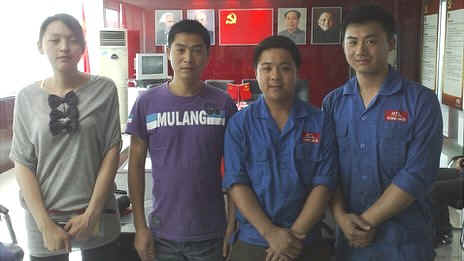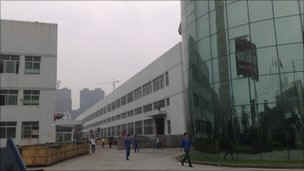|
Christian Faith plus Chinese
Productivity ¡@ |
|
|
At first glance, it looks as though it could be any other factory driving the rapid development of the Chinese economy. But this is no ordinary enterprise because here religious faith is as important as profit. In fact, the owner of the Boteli Valve Group in Wenzhou would like to see all his staff convert to Christianity. And such a factory is not a one-off: it is part of a growing number of businesses run by Christian entrepreneurs in one of China's key enterprise zones, whose success is now being studied by the Chinese government. As he shows me the production facilities, the factory's general manager, Weng-Jen Wau, tells me that every month, $5m (£3m) worth of industrial valves are manufactured. About 40% of the factory's output is exported to businesses worldwide. But he seems to have limited interest in the sales figures - he is far more concerned to tell me about the place his family's Christian faith has in the life of the factory. 'Better workers'Every Monday morning, the senior managers gather together and pray about the business. Once a week, members of staff are encouraged to attend an on-site Christian fellowship meeting, where they read the Bible and pray for each other. Weng-Jen Wau believes that by encouraging increasing numbers of his staff to convert to Christianity, his business will prosper. And he tells me that when staff do convert to Christianity, their attitude towards their work is transformed. "If you're a Christian you're more honest, with a better heart," he says. "The people who aren't Christians aren't responsible. I think it's very different. "I'm not saying those people who aren't Christians are all bad, but from the percentage of the workers who are Christians, they seem to be more responsible. "Also when they do things wrong, they feel guilty - that's the difference," he explains. One of the workers I met who had recently converted to Christianity explained that he had known nothing about the religion before he started work at the factory. But he said that his new-found faith was now a source of daily inspiration. He told me that he was now trying to convert his friends and colleagues to Christianity. "If everybody became a Christian, it would have a very big impact, and would really help the development of our factory," he said. Work ethic
So I asked Mr Wau how much religion was a factor when he was recruiting new staff. "Of course I would choose the Christians first, definitely," he said. Such comments could prompt accusations of discriminatory practice in some countries, but he had no doubt about the sort of impact Christianity could have on Chinese business. "I think if all enterprises absorb this Christian culture, we will have a much more harmonious society," he said. There are obvious questions about whether the staff really have discovered Christianity, or whether they are simply responding pragmatically to a clearly defined vision for their company. Those I met were keen to stress the significance of their new faith, and the lack of pressure to convert - though there was no disguising their bosses' clear desire to boost Christian numbers in the workforce. But the wider role of Christian entrepreneurs in the economic success of the Wenzhou private enterprise zone has not gone unnoticed by the Chinese government. Far from being regarded as a religious oddity, the impact of Christian-run businesses is now being studied by Chinese government officials. At the Chinese Academy of Social Sciences in Beijing, I met Professor Zhuo Xinping, Director of the Institute of World Religions. He specialises in the study of Christianity's growing influence in China -
and has plenty to say about Wenzhou's Christian entrepreneurs. He tells me that the city was visited by substantial numbers of Western Christian missionaries during the 19th Century and thus has - by Chinese standards - a long history of Christian faith. Today it has an unusually high number of Christians for a Chinese city - with some estimates suggesting Christians now make up 20% of the population. But what really interests him is the way in which the growth of Christianity and economic prosperity have happened side by side. He tells me that Chinese researchers are considering whether in Western history there is a link between economic prosperity and Protestant Christianity - and they are questioning what that might mean for today's China. "It's very important to find the secret of social development, the so-called potential forces for a nation," he says. "When it comes to Western countries, the majority Chinese understanding is that this potential force is Protestant Christianity." Christian faith may sound like an unlikely component in China's future economic success. But the notion that newfound faith can inspire a workforce to increased levels of productivity is being taken seriously not only by Christian businessmen, but by China's Communist - and officially atheist - leaders.¡@ <article from http://www.bbc.co.uk/news/world-asia-pacific-10942954> |
¡@ ¡@ ¡@ ¡@ ¡@ ¡@ ¡@ ¡@ ¡@ ¡@ ¡@ ¡@ ¡@ ¡@ ¡@ ¡@ ¡@ ¡@ ¡@ ¡@
¡@ ¡@ ¡@ ¡@ ¡@ ¡@ ¡@ ¡@ ¡@ ¡@ ¡@ ¡@ ¡@ ¡@ ¡@
|



